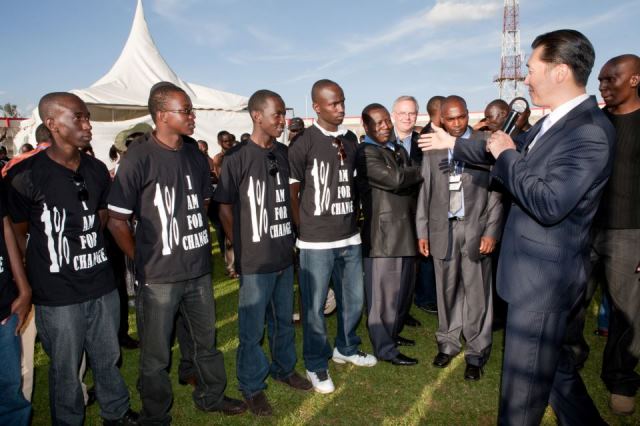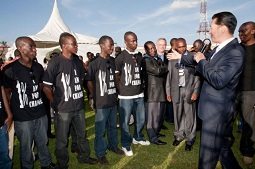The rational-choice theory that has been so popular up until now suggests that, given the right incentives and punishments, human beings and thus human societies will make rational choices. And yet, clearly, that has not been the case. War is not rational; violence is not rational; exploitative business practices are not rational; corruption is not rational.

Programs like Global Peace Volunteers, run by the Global Peace Foundation, engage youth in discovering shared values that span cultural and religious differences through workshops and volunteer work.
These are all limited, short-sided practices that result from a fundamental misperception of who we are and the ways of the universe. With this understanding, we seek a more holistic way of addressing the problems of human society through first establishing the common aspiration by which we can live, work, and organize society and its multiple sectors as One Family Under God.
The shootings at Garissa University in Kenya by a highly educated, privileged person suggest that it is not access to power, jobs or poverty that drive some to act in largely incomprehensible ways. Many – if not most – leaders of radical groups come from educated, privileged backgrounds. The many volunteers who travel at great risk to join the Islamic State from the developed nations are not simply underprivileged youth looking for jobs.
Certainly, poverty-stricken populations are very vulnerable to radicalization but perhaps it has more to do with its appeal as a way to achieve meaning and purpose in life, an inflated sense of power and a way to express one’s rage and frustration; humiliation of the human spirit. The proper response to this sort of spiritual violence is not found in political or economic solutions but spiritual ones. Perhaps understanding the spiritual principles involved allows us to create better political and economic policies and practices, but it does not work the other way around.
In short, political and economic incentives may affect human behavior on one level, but at the deepest level, we are driven by our most deeply held values. Values that are rooted in our spiritual faith, values that are rooted in the family, drive us in our choices, attitudes and behaviors at a level that goes much deeper than rational thought. It is the core of who we are; knowing this, the vision of One Family Under God “cuts to the core” by asserting our immutable, spiritual identity as the framework from which we can reform our social, political, economic cultures.
This approach seeks to change our perception of each other and ourselves as the first and most fundamental basis for change. It becomes the touchstone for all our other endeavors. It creates the basis for changing the way we do business, how political parties function, the way we educate our children, engage in service; the way we live our lives. This vision and approach are at the core of the vision of One Family Under God, and therefore is the basis for engaging multisectoral partners.
The vision, principles and values put forth in One Family Under God have been preserved and passed down through the ages of human history. People of faith resonate with the vision because it’s already familiar to them; its part of what they study and teach and communicate to their communities. The unique value-add of we must take in an interfaith approach is to bring focus to the universal principles espoused by faith traditions and implicit in the vision, and stressing the vital common mission of faith leaders to promote the greater good in civil society.

Dr. Hyun Jin Moon at the Global Peace Festival Kenya in 2010 addressing members of 1% for Change, a student leadership organization that encourages students to contribute their time, skills and resources to address community issues.
As a central aspect of our initiatives in East Africa, we are proposing a focused engagement between spiritual leaders and the youth organizations, because youth are looking for “meaning and motivation” and grappling with fundamental questions about life and reality. We need to provide opportunities to learn from, question and connect with those whose life work is rooted in these issues. Ultimately our approach maintains that identity based conflict must be addressed at its roots, through recognition of our shared identity as part of the human family under God.
In shaping a new future in the era of globalization, youth of today can embrace our common human heritage, and can build cohesion in our diverse and pluralistic world through shared values as one family under God. But they also need to connect with the wisdom of the past to make good choices for the future; the current trend of encouraging youth to “be who they want to be” or “take the lead” may lead to very dangerous consequences if they are not rooted in principles and values or the sense of a greater good!
Fundamentally, spiritual leaders have moral authority, distinct from power in that it is recognized from without rather than imposed by the person himself/herself. And rather than imposing desired behaviors through force or incentives, sparking the truth in others and helping them see a bigger picture and a greater dream of the future creates owners who will develop that vision in ways we could never imagine.
The world is now coming to recognize the problems caused by the poverty of the human spirit in the wake of secularization and globalization, but still struggles to reconcile the competing truth claims by the world’s religions. The One Family Under God vision and approach to interfaith balances these by working to articulate universal principles to create an ethical framework and create a consensus on shared values from which we can live and work together beyond perceived identities.

